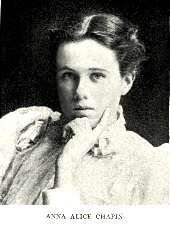Anna Alice Chapin
Anna Alice Chapin (December 16, 1880 – February 26, 1920) was American author and playwright. She wrote novels, short stories, fairy tales and books on music, but is perhaps best remembered for her 1904 collaboration with Glen MacDonough on the libretto Babes in Toyland[1]
Anna Alice Chapin | |
|---|---|
 New York Public Library Digital Gallery | |
| Born | December 16, 1880 |
| Died | February 26, 1920 (aged 39) |
| Occupation | Author and Playwright |
| Spouse(s) | Robert Peyton Carter |
Biography
Anna Alice Chapin was born in New York City, the daughter of Dr. Frederick Windle Chapin and the former Anna J. Hoppin. Her father, a native of Providence, Rhode Island, attended Trinity College, Hartford and received his medical degree from New York University.[2] Her mother was most likely a close relative of the architect Howard Hoppin (1854–1940), who designed several buildings in the Pomfret Street Historic District, including the Chapin home.[3] Chapin received a private education and studied music under Harry Rowe Shelley and published her first book, The Story of the Rhinegold, when she was just 17 years old. Her other works would include: Wonder Tales from Wagner (1898); Wotan, Siegfried, and Brunhilde (1898); Masters of Music (1901); The True Story of Humpty Dumpty: How He Was Rescued by Three Mortal Children in Make Believe Land, Illustrated & Decorated by Ethel Franklin Betts (1905); Discords (1905); The Heart of Music (1906); Königskinder (1911); The Nowadays Fairy Book (1911); The Street-Car Mystery (1911); The Spirit of the Sea (1912); The Topsy Turvy Fairy (1913); The Eagle's Mate (1914); The Every Day Fairy Book (1915); Mountain Madness (1917); and Jane (1920).[4]
Chapin also wrote many short stories for magazines and newspaper syndication, and a play produced in New York City in 1910 entitled The Deserters, written with her husband, Robert Peyton Carter. She'd married Carter, a stage actor who often worked with Maude Adams, in 1906.[5]
Film
Several of Chapin's stories were adapted for film between 1914 and 1961. The Eagle's Mate was produced in 1914 with Mary Pickford and James Kirkwood, Sr. in the starring roles. In 1919 The Deserters was released as Sacred Silence with William Russell and Agnes Ayres and in 1920 Mountain Madness came out with a cast led by Mignon Anderson, Harold Miller (1894-1972) and Ora Carew. The Girl of Gold written with Cleveland Moffett first appeared in the magazine Snappy Stories as a serial running from December, 1919 to March, 1920 and was produced as a film with Florence Vidor, Malcolm McGregor and Alan Roscoe in 1925. The libretto Babes in Toyland was first seen on film in 1934 as a vehicle for Laurel and Hardy and again in 1961 with Ray Bolger, Tommy Sands and Annette Funicello.[6][7]
Death
Not yet forty, Chapin died after a short illness at her residence on West Thirteenth Street, New York City. She was preceded in death by her husband who had appeared on stage as recently as March 1918 supporting Maude Adams in A Kiss for Cinderella.[5][8]
Sources
- Babes in Toyland (advertisement). The New York Tribune, October 30, 1904, p. 10 accessed 6.17,13
- New York University, General Alumni Catalogue: Medical alumni, 1833-1907, 1908, p. 266 accessed 6.17.13
- American Architect and Architecture, Volume 19, p. vii accessed 6.17.13
- The Encyclopedia Americana: A Library of Universal Knowledge, Volume 6, 1918, p. 296 accessed 6.17.13
- Anna Alice Chapin Dead. The New York Times, February 27, 1920, p. 13
- The American Film Institute Catalog, (Kenneth White Munden, editor), 1997, p. 283 accessed 6.17.13
- Anna Alice Chapin - Internet Movie Database accessed 6.17.13
- Maude Adams. Syracuse Herald, March 12, 1918, p. 8